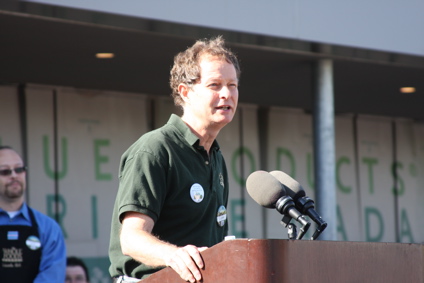 John Mackey: will the unfettered market bring him down? Photo: JOEM500, via Flickr
John Mackey: will the unfettered market bring him down? Photo: JOEM500, via Flickr
Author’s note: In the original version of this post, I mistakenly wrote that Mackey had resigned from the Whole Foods board. Actually, he resigned from the chairmanship of the board, but retained his seat on the board. I regret the error.
———–
Under pressure from a variety of shareholders, Whole Foods founder John Mackey has stepped down as chairman of his company’s board of directors. He will continue serving as CEO.
Just before the announcement, The New Yorker ran a long and entertaining profile of Mackey by Nick Paumgarten. The two events–the publication of the New Yorker piece, quickly followed by Mackey’s board resignation–may not be coincidental. In recent years, buffeted by self-generated controversy, Mackey has sought to exert careful control over his media image. He makes a game effort with Paumagarten. “I no longer drink alcohol around journalists,” Mackey tells him. He adds: “I am not going to talk about my sex life,” even though Paumagarten had not asked.
Despite those undoubtedly wise precautions, Mackey emerges from Paumgarten’s gentle piece as a bit of a nut.
We see him engaging in new-age babble, declaring “I am self-actualizing myself” and subjecting himself to something called “the Course.” We find him behaving like a jerk, alienating underlings (“executive-retreat volleyball games had to be scrapped, owing to Mackey’s intensity and his ill-disguised scorn for less capable teammates”) and sending fellow executives into grumpy exile. Mostly, we find him justifying his Randian faith in hyper-capitalism, as zealous as a Christian’s belief in the Resurrection.
In green circles, the money shot is probably the bit about climate change–it turns out the founder of the iconic “certified organic supermarket” is a bit of a denier (don’t tell Paumgarten’s colleague Michael Specter). Paumgarten writes:
One of the books on the list [of what Mackey was reading] was “Heaven and Earth: Global Warming-the Missing Science,” a skeptical take on climate change. Mackey told me that he agrees with the book’s assertion that, as he put it, “no scientific consensus exists” regarding the causes of climate change; he added, with a candor you could call bold or reckless, that it would be a pity to allow “hysteria about global warming” to cause us “to raise taxes and increase regulation, and in turn lower our standard of living and lead to an increase in poverty.” One would imagine that, on this score, many of his customers, to say nothing of most climate scientists, might disagree. He also said, “Historically, prosperity tends to correlate to warmer temperatures.”
In one deft paragraph, Paumgarten skewers Mackey’s unfortunate recent foray into healthcare punditry, as well as his long-time hostility to labor unions:
It sometimes sounds as if he believed that, if every company had him at the helm, there would be no need for unions or health-care reform, and that therefore every company should have someone like him, and that therefore there should be no unions or health-care reform. In other words, because he runs a business a certain way, others will, can, and should, and so the safeguards that have evolved over the generations to protect against human venality–against, say, greedy, bullying bosses–are no longer necessary. The logic is as sound as the presumption is preposterous.
I think this captures the quintessence of Mackeyism: an earnest faith, backed up by his own personal virtue, that unfettered capitalism paves the way to social utopia.
No doubt, Mackey himself is a benevolent corporate chief. The market values Whole Foods at $4 billion, yet the total value of Mackey’s Whole Foods shares is just $31 million. Nearly all founders of corporate empires manage to grab a much larger share of the loot than that. His annual salary as CEO: $1. And he has imposed a kind of austerity on his fellow execs: “No one at the company can have a salary more than nineteen times what the average team member makes,” Paumgarten reports. “On average, an S. & P. 500 CEO makes three hundred and nineteen times what a production worker does.” And for Whole Foods employees, “The health and retirement benefits are relatively generous.”
Yet those policies are driven not so much by the market as by Mackey’s own personal beliefs–and the market could soon crush them. Mackey is losing control of the company; other, less loftily idealistic capitalists are moving in. As CEO, he’s the functionary of a corporate board he no longer dominates–one bound by law not to serve Mackey’s ideals, but rather to maximize shareholder profit. Writes Paumgarten:
Last fall, as the recession deepened, Whole Foods’ sales, and its stock, suffered badly, and the company was forced to raise capital. Leonard Green & Partners, a private-equity firm, bought seventeen per cent of the business, and got two seats on the board. Yucaipa, a firm run by the grocery billionaire and Democratic Party donor Ron Burkle, bought a seven-per-cent stake and has been looking over Mackey’s shoulder.
Thus while Mackey the capitalist ideologue does his best to take care of his workers, the capitalist sharks are circling. “We’re trying to do good. And we’re trying to make money,” Mackey tells Paumgarten. “The more money we make, the more good we can do.”
But the investors now taking control of Whole Foods are likely more interested in the money than in the good. When profits falter, the “power of conscious capitalism” (the subtitle of Mackey’s book) succumbs to the power of unfettered capitalism. If I were a Whole Foods “team member,” I’d be seriously considering starting a union to protect wages and benefits. And as a backup plan, I’d be agitating for universal health care.



